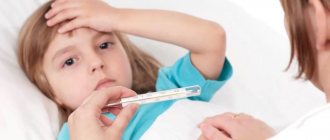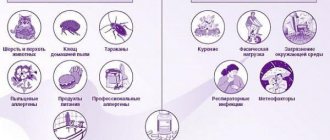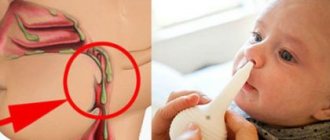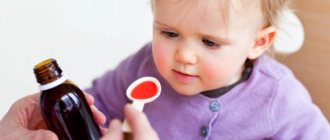Mom's cough after childbirth is dry
A mother’s care for her child is not only about feeding, bathing and changing the baby’s clothes in a timely manner. Every mother wants to limit her child from diseases and harmful things. But how can you do this if your mother gets sick and is forced to take medications? Many of the medications enter the baby's body during breastfeeding. How to choose harmless and active ingredients?
Possible causes of dry cough in a nursing mother
There can be many reasons, each of them requires attention and a special reverent attitude, because the health of at least two people depends on the correct treatment tactics.
And there may be several reasons for the occurrence of a symptom.
- Everyone remembers the beginning of the heating season in apartments, and what follows – exacerbation of chronic diseases and a protracted period of ARVI. Why is this happening? After heating the batteries, the air in the apartment becomes dry. This cannot but affect human health. The mucous membranes in the mouth and nasal cavity dry out. If the new mother also drinks little ordinary water, rhinitis develops and a regular dry cough appears.
- Pharyngotracheitis is the most common cause of long-term symptoms. Non-bacterial inflammation of the head and trachea is often accompanied by a cough.
- Allergies, the body’s reaction to detergents, dust on furniture, sand or cosmetics, are sometimes caused by many things around a person. One of its possible and frequent manifestations is a constant dry cough.
- The use of the same antiallergic substances, medications that lower blood pressure and other drugs leads to a dry cough.
- Chronic bronchitis is often aggravated by a dry cough in bad weather conditions.
Treatment of dry cough during lactation
The sequence of actions is important here. A few simple measures available to all women can help cope with a cough:
- Many people are saved by air humidification during the heating season;
- drink plenty of fluids with sufficient use of regular drinking water;
- exclusion of possible allergenic medications, products, household chemicals;
- temporary refusal or adequate replacement of drugs that cause cough, which you should definitely consult with your doctor;
- daily inhalations with mineral water or regular saline will help the mucous membranes breathe and at least reduce the symptoms of cough. Read more about inhalations for dry cough;
- For proper and timely treatment, you need to be fully examined - while breastfeeding, a woman can undergo an x-ray if necessary to establish the correct diagnosis.
If all of the above measures are not enough or the most unpleasant diagnosis is confirmed (bronchitis, pneumonia), you should immediately resort to drug treatment.
- Expectorant preparations. In the pharmacy you can find them in separate boxes, the instructions of which should indicate that such products are approved for use by pregnant and breastfeeding women. They may include plantain, coltsfoot, sage leaves, and chamomile.
- To remove sputum, expectorants and herbal preparations are prescribed. In order not to get confused at the pharmacy when choosing suitable medications, you need to choose those that are prescribed to children from birth. Marshmallow, mucaltin, glauvent, thermopsis are used. About how mucaltin acts on the body.
- Mucolytic drugs are used in a short course of about 5 days. For this purpose, carbocisteine and acetylcysteine are prescribed.
Herbion for dry cough during breastfeeding
Cough syrup, used more often by pediatricians for children and for the treatment of dry cough in adults. Is it suitable for nursing mothers?
In this case, you need to rely on the instructions. It says that during pregnancy and lactation the drug is prescribed according to strict indications.
The medicine contains extract of plantain leaves and mallow flowers, in addition it contains water and vitamin C. At first glance, it appears to be a good balanced composition. But it is better not to use it to treat dry cough in a nursing mother.
Firstly, it is indicated only for children over two years of age, and secondly, no studies have been conducted on pregnant women and nursing mothers. Therefore, its use is allowed only if the mother has stopped breastfeeding.
A correct diagnosis is already half the treatment. A mother’s cough during breastfeeding is an undesirable problem, but quite fixable. Treatment for this unpleasant symptom should begin with a trip to the doctor and a full examination.
source
How to treat dry cough while breastfeeding
A cold, which is accompanied by a runny nose, headache and dry cough, is a common occurrence. This symptom often occurs during breastfeeding.
This is explained by the fact that the body of a lactating woman is subjected to severe stress during pregnancy and after childbirth, as a result, the immune system is weakened.
For this reason, the likelihood of catching a cold with cough increases. Then the mother looks for treatments that are safe for the baby.
In most cases, a cold appears suddenly due to hypothermia or a long-term illness. Coughs are often provoked by viruses, bacteria, and a little less often by allergies. It is important to determine the cause of the cough and carry out comprehensive treatment.
Colds and coughs during lactation
The most common ways of causing the disease:
- The mother's immune system is weakened due to prolonged or regular exposure to cold (for example, walking in windy, cold weather). In this case, the next day the woman develops a runny nose, sore throat, and dry cough.
- There is another scenario when a nursing mother becomes infected from her relatives or friends who have a cold. Then the cough appears after contact with a sick person.
That is, often a cough during breastfeeding is a consequence of an infectious disease. Therefore, you should visit a doctor as early as possible to start treatment and not infect the baby. If this symptom occurs against the background of diseases of the respiratory organs, then it is not difficult to cure.
Cough can be viral, bacterial or allergic in nature. It indicates a problem with the upper airways. After a few days, the dry cough transforms into a wet cough. This indicates that the disease has entered a new stage.
If you have a cough during breastfeeding, consult your doctor. Self-treatment may be ineffective or harm the baby.
Medicines against dry cough
Cough during lactation is often treated with medications. Many mothers wonder what can be used to eliminate the debilitating symptom. Syrup is one of the most popular dosage forms.
Lactating women use medications based on herbal ingredients (anise, thyme, ivy, thyme, etc.).
However, even such drugs do not guarantee complete safety for the newborn, since they have not been tested on this group of patients.
For lactating women, syrups based on plant extracts are used:
- Gedelix, based on extracts from ivy and other plants, is also used to eliminate spasms.
- Overslept. The medicine also contains ivy extract.
- Gerbion. The main components of the drug are an extract from plantain and mallow. This remedy guarantees effective treatment of colds.
As indicated in the World Health Organization reference book, the following tablet preparations are allowed to relieve cough during breastfeeding:
- Ambroxol, Ambrobene, Lazolvan, Ambrohexal. The basis of these products is ambroxol. According to doctors, this component does not pass into breast milk, and therefore it can be used by a coughing mother.
- Fliumucil, ACC are also not contraindicated during feeding. The active ingredient is acetylcysteine (amino acid). The medicine is sold in the form of tablets and powder.
- Mucaltin is a proven drug for dry cough.
- Furacilin tablets are used for gargling.
- Lizobakt eliminates soreness and softens the mucous membrane.
In addition, aerosols are used to relieve coughs and tickles. Hexoral based on hexethidine inhibits the development of pathogens on the mucous membrane. The therapeutic effect lasts about 12 hours. The drug is available in the form of a rinse.
Tantum Verde eliminates the inflammatory reaction. This is a safe remedy for a lactating woman and baby (subject to a therapeutic dose). The spray can be used at intervals of 1.5 - 3 hours.
Chlorophyllipt is an antibacterial aerosol based on eucalyptus leaves that will speed up recovery. In addition, an oil solution is used to treat the nasal passages.
Bioparox with antibiotic is made in France. A small dose of the drug penetrates into the blood and milk. According to doctors, this drug is allowed to be used during lactation.
Treatment of cough of viral and bacterial nature
As mentioned earlier, treatment of cough while feeding is allowed only after the approval of an otolaryngologist.
This is due to the fact that only a doctor will determine the exact cause of the spasms and select the appropriate medications for treatment.
However, many medications are contraindicated for nursing mothers, which increases the likelihood that treatment will be delayed. Therefore, therapy should be started when the first symptoms appear.
If a dry cough in a nursing mother occurs against the background of a bacterial infection, then treatment is carried out using antibacterial agents. If milk production is not impaired, then Amoxiclav is allowed to be used. The medicine will destroy pathogenic microorganisms, eliminate cough, inflammation, and speed up recovery.
If the doctor prescribed Amoxiclav, then it should be taken immediately after feeding the newborn. If the interval between feedings is 3–4 hours, then during the baby's next meal the level of medication in the milk will decrease. That is, the likelihood that the drug will harm the baby will be zero.
Source: https://ckiom.ru/kashel/kashel-posle-rodov-u-mamy-suhoy/
Cough during breastfeeding: how to treat a nursing mother
The body's protective reactions are weakened after childbirth. Often, a woman during lactation experiences a cold complicated by a cough. The respiratory tract is irritated by viruses, bacteria, allergens, and toxic compounds.
Without the help of a specialist, it is difficult to choose tactics for treating cough during breastfeeding and to determine its cause. Many medications are incompatible with lactation.
Before taking a drug, be sure to take into account its effect on the composition of milk and possible risks for the child.
Coughing during breastfeeding is not uncommon, but there are a large number of medications, herbal and folk remedies that allow the mother to cope with it safely for the baby.
Is it possible to feed the baby during treatment?
Cough is not a contraindication to lactation. The baby can become infected from the mother through airborne droplets, but not through milk. When an infection enters the body, a woman’s immune system actively fights germs.
Blood cells produce antibodies, which in the form of special proteins - interferons - penetrate into milk. They act like a vaccination on a child - they protect the body from infection.
If a woman continues to breastfeed during her illness, the likelihood of transmitting the infection to her baby is significantly reduced.
Treatment of cough is compatible with lactation if appropriate medications are chosen. There are plenty of such products in pharmacies.
Causes of cough
The symptom appears as a result of irritation of the posterior wall of the larynx, trachea, bronchi, and pleura. The cough continues until the airways are completely clear of excess mucus. The viscous liquid absorbs foreign components and reflexively removes them through contraction of the diaphragmatic muscles. Irritation of the cough zones may occur in a nursing woman for the following reasons:
- Contact with a sick person. The infection is quickly transmitted through household contact. Depending on the immune system, it can occur in different ways. In people with good protective reactions, ARVI is limited to a slight malaise and a sore throat. The malaise lasts 2-3 days. If the immune system is weakened, the same type of virus manifests itself with high fever, runny nose, cough and can be complicated by a bacterial (secondary) infection.
- Cold. Uncomfortable temperatures and windy weather provoke weakening of the immune system. Blood vessels constrict under the influence of cold. This process disrupts the flow of blood to the organs. Defense reactions weaken. Bacteria and viruses enter the mucous membrane without obstacles, causing coughing during gw.
- Allergic reaction. Increased sensitivity to any substance can be either congenital or acquired. Allergies are caused by cosmetics, food, plants, and animal fur. When it comes into contact with an allergen, the immune system produces histamine. Under the influence of this substance, the mucous membrane of the larynx and bronchi is irritated. This reaction provokes a dry, sometimes barking cough.
The symptom can indicate many diseases. They are not always associated with damage to the respiratory system. The diagnosis can only be made by a doctor, taking into account the woman’s complaints and examination of the mucous membranes. Sometimes, to find out the cause, a consultation with an otolaryngologist, a blood test, and a urine test are required.
Allergy treatment
An irritating cough is often accompanied by a profuse runny nose, sore throat, and swelling of the throat. To cure such a cough during lactation, first of all, you need to establish the cause of the reaction and prevent the allergen from getting on the mucous membranes.
New foods in the diet, household chemicals, cosmetics, and deodorants come under suspicion. A sore throat that irritates the throat can occur in a nursing woman during the flowering period of, for example, birch. In summer, discomfort occurs due to the abundance of poplar fluff.
Common allergens are also fungus, house dust, and animal hair.
Treatment of allergic cough in nursing women begins with taking enterosorbents: Smecta, Polysorb, Activated carbon. These drugs absorb harmful compounds.
Absorbents are taken separately from other medications, regardless of feeding the baby. They are not absorbed into the blood. Together with allergens, enterosorbents absorb useful substances, so they are taken for no more than 3-5 days.
Allergic cough is treated with antihistamines. During lactation it is allowed to take:
- Fenistil;
- Cetirizine;
- Loratadine;
- Erius;
- Alcedin.
The popular drug Suprastin is not compatible with breastfeeding. The active substance Chloropyramine is absorbed into milk and can cause abnormalities in the baby. Drugs prohibited for hepatitis B also include Tavegil, Theophylline, Diazolin.
How to treat dry cough during lactation
To alleviate the course of the disease, the woman is prescribed local and oral medications. Taking pharmaceuticals is combined with drinking plenty of fluids. Sufficient fluid intake will speed up recovery.
A nursing mother can take approved cough syrups and tablets. For spasms caused by a sore throat, sprays and chest packs are prescribed.
Inhalation with a nebulizer will help speed up the elimination of viruses and bacteria.
Syrups
Preparations for oral administration are prepared from extracts of medicinal herbs and plants. The most effective in treating dry cough during breastfeeding are syrups based on natural ingredients: ivy, plantain, rose hips, chamomile, primrose. They are safe for the baby if the woman follows the recommended dosage.
Syrups compatible with lactation:
- Overslept.
- Gerbion.
- Gedelix;
- Doctor Mom:
- Stodal.
Bromhexine-based products should not be taken during breastfeeding, as it passes into milk.
For the treatment of cough during hepatitis B, Prospan is often prescribed, both in the form of syrup and tablets.
Pills
A dry cough usually appears in the first stage of the disease. To relieve spasms in the respiratory tract, you need to choose a suitable set of drugs. Dry cough during breastfeeding is relieved by tablets that stimulate the discharge, production, and dilution of sputum:
- overslept;
- Sinekod (dragée).
For a viral infection, Viferon suppositories are prescribed. This drug helps the immune system cope with infection and, as a result, cough.
Bacterial infections during breastfeeding are treated with penicillin antibiotics (Amoxiclav, Ampicillin), if there is no other option. The dosage is selected individually by the attending physician. Antibiotics of other groups are not compatible with breastfeeding.
After taking these drugs, a nursing woman's intestinal microflora is disrupted. The antibiotic often causes problems with bowel movements and colic in the baby. Within a week, the microflora returns to normal.
With long-term use of antibiotics, probiotics and fermented milk products help normalize intestinal function in a nursing woman.
During breastfeeding, Lizobact tablets are allowed to be dissolved. They help with sore throat, which most often causes a dry cough. Lizobakt has an antiseptic, anti-inflammatory effect and stimulates the immune system. The active ingredients are lysozyme (natural enzyme) and pyridoxine (vitamin B6).
Sprays
Improves the condition of dry cough by gargling. Approved antiseptics - Chlorhexidine, Furacilin. Sprays will help get rid of cough during lactation:
- Hexoral;
- Inhalipt;
- Tantum Verde.
It is better to spray the throat after feeding.
Inhalations
The most effective way to moisten a cough is to use a nebulizer. With the help of this device, the active substance is immediately delivered to the desired parts of the respiratory tract.
To alleviate the course of the disease without harm to the child, sometimes it is enough to take 1-2 inhalations with saline solution (0.9% sodium chloride). It is sold in glass bottles.
Depending on the cause of the cough and its nature, the doctor may prescribe inhalations with Miramistin, Lazolvan.
Inhalations with a nebulizer will help a woman moisten her cough. They are safe during breastfeeding for both the nursing mother and the baby.
Herbs
To alleviate the condition, a rosehip decoction is suitable. It contains a lot of vitamin C. In addition, warm drinking promotes the formation of sputum and its removal. Sometimes Furacilin irritates the throat with a dry cough.
In this case, it is better to use herbal infusions for rinsing. Chamomile, sage, calendula are suitable. To relieve a cough, you can take breast milk, but only with your doctor's permission.
Herbs have high biological activity and can have a negative impact on the behavior and well-being of the baby.
Collection No. 1
A medicine based on coltsfoot, oregano, and marshmallow root. A decoction or infusion is made from it. This collection is effective for laryngitis and tracheitis. The combination has an antimicrobial effect and relieves spasms.
Collection No. 2
Includes licorice root, coltsfoot flowers, plantain. This combination is prescribed for bronchitis and pneumonia.
Collection No. 3
Has a softening, anti-inflammatory effect. It is a mixture of anise, pine buds, marshmallow, sage, and licorice. This remedy may worsen the condition if taken in combination with antitussive medications that reduce phlegm production.
Collection No. 4
Consists of a mixture of wild rosemary, calendula, chamomile, mint, licorice, violet. The medicine is prescribed for non-productive cough. Calendula can cause menstruation and, as a result, decreased lactation. It is better to replace such a collection with another remedy during guarding.
Breastfeeding is one of the acceptable treatment options for coughs, but it is better to use them after consultation with a doctor, strictly monitoring the condition of the nursing mother and child and the lactation process.
Treatment of wet cough during lactation
If a woman produces sputum, cough treatment includes products that can be used during breastfeeding:
- Inhalations with Ambroxol (Ambrobene, Lazolvan). During the procedure, the medicine is almost not absorbed into the blood. The solution is prepared with sodium chloride solution in a 1:1 ratio. Taking Ambroxol orally is undesirable during lactation, because The effect of this substance on milk has not been fully studied.
- Warming ointments Vicks Active, Doctor Mom. To relieve spasm, they are rubbed into the back.
- Syrups with mucolytic action - Althea, Gerbion, Stodal. They thin mucus and relax the bronchi.
- Mucaltin tablets. This is a herbal remedy based on the marshmallow plant and soda. Mucaltin does not spoil the taste of milk and is safe for the baby. The product improves mucus secretion, relieves inflammation and irritation of the respiratory tract.
Folk cough remedies for a nursing mother
Home remedies are combined with medications prescribed by a doctor. Traditional methods of treating cough:
- Steam inhalations. If you don't have a nebulizer at home, you can breathe over the steam. Herbs are brewed in a saucepan. It is best to treat a cough with calendula and sage. Steam particles moisturize the respiratory system, cleanse germs, and relieve inflammation. Inhalations should not be carried out if a nursing woman has an elevated body temperature.
- Dry cough is treated with warm milk with the addition of a teaspoon of butter and a pinch of soda. The product is drunk before bedtime. Milk can cause increased gas formation and colic in children under 6 months of age.
- Plantain infusion. The leaves of the plant are effective for any type of cough. For a glass of boiling water you will need 2 tablespoons of chopped plantain. The infusion is drunk between meals 3 times a day.
Prevention
If a nursing woman has the first signs of a cold, measures should be taken to prevent the disease from being complicated by a cough:
- Drink more fluid. The body cleanses itself of germs faster if you follow a drinking regime.
- Ventilate the room regularly. The optimal temperature to ease the course of the disease is 22 degrees.
- Maintain a normal level of humidity in the room. This indicator is important for a quick recovery.
- Refuse to take a hot bath or sauna to prevent inflammation from spreading to the lower respiratory tract.
To protect your child from illness, doctors advise wearing a medical mask. It should be changed every 2 hours.
Proper comprehensive treatment of cough will allow a nursing mother to quickly return to a healthy state and give the baby even more warmth, attention and tenderness.
Cough during breastfeeding must be treated. This will help avoid lactostasis and mastitis due to decreased immunity.
Tablets and syrups are taken after feeding to limit their possible effect on the baby.
Sore throat during gw: what to do?
Source: https://prostoGV.ru/healthandbeauty/medicaments/kashel-pri-gv
Why does a cough appear and how does it happen?
The most common cause of cough is a cold. In this case, cough is only one of the symptoms of the disease. Perhaps you took a walk with your baby in cold weather or were in a draft for a long time. In addition to cough, respiratory disease may be accompanied by:
- runny nose;
- increased body temperature;
- sore throat;
- weakness;
- general malaise.
Causes of cough can also be a viral or bacterial infection, allergies, and in rare cases, heart problems or pulmonary failure. Cough can be a symptom of many diseases
Types of cough
A cough, in essence, is a spasm of the respiratory tract - upper (larynx) or lower (bronchi). This phenomenon is a protective reaction of the body, which tries to get rid of microbes by reflexive muscle contraction.
The following types of cough are distinguished:
- dry (unproductive, barking or paroxysmal, without sputum discharge);
- wet (productive, with sputum discharge, may be accompanied by wheezing, heaviness and chest pain).
In the first days of the disease, as a rule, the cough is dry. This indicates that the throat and upper respiratory tract are irritated. After a few days, the dry cough becomes wet. This means that the disease has entered another phase. But there may be another, unfavorable scenario - a dry cough will “sink” into the bronchi, they will become inflamed and swollen. In this case, it is problematic to cough up phlegm; the cough causes anxiety and becomes heavy and chesty. In the absence of adequate treatment, complications are likely to develop: bronchitis, pneumonia and others. A cough should be taken seriously and treated as soon as possible rather than hoping it will go away on its own. A cough can cause serious discomfort, so treatment should be started as early as possible
Mom's cough: is it possible to breastfeed?
When a cough occurs, caring mothers experience reasonable concern for the baby. However, coughing is not a reason to stop breastfeeding. On the contrary, if the child does become infected during communication, mother’s milk will help him cope with the disease faster. Interferons - antibodies to the virus that are released in the body during illness - enter the milk and are passed on to the baby.
The following precautions will help minimize the risk of infection for your child:
- It is recommended to wear a medical mask and change it to a new one every two hours.
- It is necessary to ventilate the room several times a day, regularly wash your hands with soap, especially before feeding.
- It is necessary to increase the volume of liquid consumed: water, compotes, tea. This will prevent lactostasis due to an increase in milk viscosity at elevated body temperatures. Water also helps remove toxins and ease the course of the disease. Additional fluid helps your cough change from dry to wet and allows you to get rid of phlegm faster.
How to help a nursing mother if she starts coughing
All materials on the site are published under the authorship or editorship of medical professionals, but are not a prescription for treatment.
Contact the specialists!
A newborn baby becomes the whole universe for caring parents. Sometimes mothers forget to take care of their own health. Colds attack easily, since the body is still weakened after childbirth.
Therefore, it is important to understand how to treat a cough while breastfeeding, so as not to harm the baby and not cause the disease.
Cough during lactation: where does it come from?
How to treat a cough if a woman is breastfeeding her baby? This is a question many mothers ask when they find themselves in a therapist’s office. Lactation period is considered a contraindication for many conventional medications. Therefore, doctors recommend taking preventive measures to avoid illnesses associated with inflammation of the respiratory system.
For nursing mothers, it is unclear where the infection comes from. There may be several sources:
- Contact with a sick person. Visiting public places or the arrival of careless guests who did not think that they were a source spreading viruses and bacteria are the most popular causes of a cold in a new mother.
- Hypothermia while walking. The habit of walking without a hat or with an open jacket is fraught with colds. The immune system is weakened after nine months of pregnancy.
- Draft in a house or apartment - the disease most often develops for this reason in the summer, when parents feel that the room is stuffy. Open windows and doors are also dangerous for the health of the baby. Of course, you need to ventilate the rooms, but this is done while walking outside. Small children do not have a natural thermometer; their bodies cannot adjust to the ambient temperature.
Cough during breastfeeding is a common problem. If mommy feels that an infection has settled in her body, she should urgently consult a specialist. Therapy is carried out only after the type of bronchospasm is established:
- unproductive - dry cough during breastfeeding indicates inflammation of the upper respiratory tract;
- productive - when coughing with sputum, one can suspect the transition of the disease to the next phase - damage to the lower respiratory organs has occurred. It appears after several days of infection with viruses or bacteria.
Treatment of dry cough in an adult at home
Treatment of cough during breastfeeding should only be prescribed by a therapist. It is impossible for the disease to develop into a more serious inflammation.
A nursing mother has bronchospasm: what can you do?
When breastfeeding, signs of cough must be eliminated comprehensively. Bronchial spasm is a symptom of some disease, this is how the body reacts to the ingress of bacteria or viruses. Cough medicines should only be taken after consulting a doctor. But there are a number of recommendations that every woman must follow during such an unpleasant condition:
- Nursing mothers do not need to wean their baby from the breast. Antibodies are formed in milk on the fifth day of disease development. They have a strengthening effect on the newborn's immune system.
- There is no need to rush to use potent medications. Antibiotics are not recommended and are prescribed only as a last resort.
- The infection is transmitted by airborne droplets. To avoid infecting the baby, you must wear a medical bandage; it must be changed every 3-4 hours. Hands should be washed before each feeding to protect the newborn from contact with harmful microorganisms.
- You can drink various dried fruit compotes and tea. The drinking regime should not be violated, as lactostasis may form due to high temperature. During a dry cough, you need to drink a lot of fluids to start producing sputum.
Pharmacy medications can help a nursing mother with a cough, but they should only be purchased by visiting a therapist. You cannot self-medicate and continue breastfeeding. There is also no need to ignore therapy, otherwise pneumonia or pneumonia may develop. Then you will generally have to recover in a hospital setting.
How to treat a cough in a nursing mother: advice from a therapist
There are a variety of cough medications in pharmacies, but not all of them are suitable for therapy during lactation. During breastfeeding (breastfeeding), mothers may be prescribed the following medications:
- breast collection - it is a mistake to believe that traditional methods are completely safe. These products contain plants that can cause an allergic reaction in a child. If spots appear on the baby after feeding, it is better to immediately stop taking the decoctions;
- tablets - they are recommended to be used to treat dry cough. The instructions should be read carefully to make sure that the composition does not contain components that can harm the newborn;
- syrups - coughing during lactation is possible with this drug, but if the cold is just developing;
- lollipops and records - have a local effect, mostly used to relieve attacks that interfere with rest;
- spray - prescribed if a woman still complains of a sore throat;
- inhalation is the safest way to get rid of cough during lactation;
- antibiotics - prescribed during a serious form of bronchospasm. During therapy, it is better to refuse to feed the newborn.
Signs and symptoms of whooping cough in adults
It is not easy to cure a cough in its advanced form. The main thing is not to delay the course of the disease. If the doctor offers an integrated approach to treatment, then not a single point should be ignored.
What can a nursing mother do for a cough, and what pills should she take?
It is allowed to take the medicine, but you need to take a responsible approach to the selection of medicines. Adults find it convenient to take pills, so therapists often choose this form of medication. But you must always read the instructions; we must not forget about individual intolerance to some components.
A cough in a nursing mother can be treated with the following tablets:
- Preparations containing the active ingredient ambroxol. Numerous studies have shown that this substance does not pass into breast milk, so tablets are prescribed for breastfeeding. The following drugs can be found in the doctor's prescription - Ambrobene, Lazolvan and Ambrohexal.
- ACC - the effervescent form is very convenient to take; many people like the pleasant taste.
- Mucaltin - during lactation, these tablets have been recommended since ancient times. The drug has been tested by time; no negative reactions from the newborn’s body have been identified.
- Lizobakt is a dissolving tablet that allows you to get rid of an unpleasant sore throat.
- Furacilin - dry cough during lactation is often treated with this medication. Doctors recommend crushing the tablets and dissolving them in water; this is a good rinse.
Ladies who are treating bronchospasm during hepatitis should drink a lot. The liquid removes harmful microorganisms and their metabolic products.
How to treat cough while breastfeeding and how to choose decoctions
A nursing mother has a weakened immune system. Breast packs will help strengthen it and cope with the infection. How can you treat bronchospasm so as not to harm the baby? Pediatricians recommend choosing the following fees:
- collection No. 4 - it consists of chamomile, blackcurrant leaves and berries. When breastfeeding, it is generally useful to drink a decoction from this set several times a week. The easiest way is to buy herbs in bags that can be easily brewed in a mug;
- Rosehip decoction is an excellent expectorant and a source of vitamin C. The berries of the plant can be added to tea; this is a good prevention of colds;
- sage decoction for gargling - treating a cough for a nursing mother in this way is only suitable in the initial stages.
You can also breathe in eucalyptus vapor to cause phlegm to appear. To do this, add a few drops of essential oil to boiling water. Home inhalation should be done before bedtime. This procedure also calms the nervous system.
Inhalations are an effective means of suppressing cough symptoms. The procedure is carried out using a nebulizer. The following products are used as an active drug: mineral water, Miramistin, herbal decoctions and special solutions developed for the device.
Traditional methods of fighting cough
The most effective and simple method of fighting a cough at home is gargling. This procedure can be performed on women at any stage of pregnancy. It is completely safe for both mother and child. At the same time, the number of rinses per day is not limited. To obtain a healing effect, you can use baking soda and table salt. Herbal infusions that are acceptable for use during pregnancy give good results.
High effectiveness in treating cough can be obtained by purchasing a special inhaler. If you suffer from a dry cough, you can use the following well-known herbs: thyme, St. John's wort, chamomile. Also, freshly squeezed radish juice mixed with honey is suitable for these purposes. The healing mixture should be taken 1-2 tablespoons 5 times a day.
For wet coughs, string, eucalyptus, wild rosemary and lingonberries are excellent. Essential oils can be used as active ingredients during inhalation, which quickly relieve irritation of the mucous membrane of the respiratory tract and eliminate inflammation. A honey-onion mixture is an excellent treatment for coughs with phlegm.
If you have a sore throat, you can completely use lozenges with eucalyptus, mint or lemon. These medicinal sweets contain no sugar, and herbs are contained in concentrations acceptable for pregnant women. Moreover, cough drops provoke constant production of saliva, which, in turn, has an excellent moisturizing effect for the larynx and nasopharynx.








